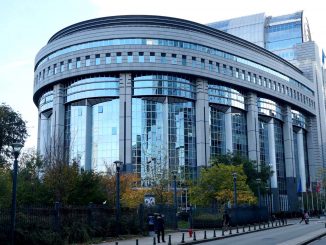What are the options for co-legislators and the Commission in the ongoing trilogue negotiations? How far are they from the European green deal? And what can member states do in their CAP Strategic Plans to align with Green Deal objectives, and, more broadly, substantially raise the environmental and socio-economic standards of CAP supports? A new report sheds some light on these crucial questions. Led by ARC Policy Analyst Matteo Metta and commissioned by MEP Martin Hausling, it launches at an event tomorrow in German and the following day in English.
When it comes to CAP, at national and EU level, its all still to play for. There are a number of reasons to say this. Trilogies between Commission, Parliament and Council are still ongoing, and the Commission is playing a stronger role at this stage than in previous reforms. The Commission is trying to integrate European Green Deal considerations into the debate, via what’s been called a fifth column. Member States are in the process of submitting Strategic Plans, but, in many cases, there still have a number of stages to go through. 2021 will see assessment of needs, designing of intervention strategies, and setting up of arrangements for the new delivery model being established stage by stage.
Finally, the next CAP has until January 2023 to come into force, thanks to a transitional arrangement being in place between now and then. All of this means there are options, there is time, and a number of aspects of this wide process can be adjusted and improved.
Given this context, the office of MEP Martin Hausling (Greens/EFA) commissioned ARC’s Policy Analyst Matteo Metta and Sebastian Lakner (Professor of Agricultural Economics at the University of Rostock, Germany) to critically assess where we are at and what our options are.
This new study – Post-2022 CAP in Trilogue Negotiations: Reflections and Outlook for CAP Strategic Plans – will be launched in German tomorrow (28th January) as part of an event (register here) organised by the Hausling office on the EU Green Deal and EU agri-food policy. Hausling, agriculture policy spokesperson for the Greens/EFA in the European Parliament, will be joined by Frans Timmermans (Vice President of the European Commission) Silvia Bender – (State Secretary for Agriculture, Environment, Climate Protection Brandenburg, Germany) Bernhard Krüsken – General Secretary of the German Farmers’ Association, Lucia Parbel – Fridays for Future, while Hannes Lorenzen – President of ARC2020 will represent Matteo and ARC at this German language event.
Following this, we’ll publish the English language version here on ARC2020. The core elements in this report are:
- What are the opportunities and limitations of the positions adopted by the co-legislators in October 2020, particularly in relation to the integration between the CAP reform and the European Green Deal?
- What policy scenarios are still available to align the CAP to the European Green Deal, also including the withdrawal of the 2018 Commission’s proposal and the preparation of new legislation?
- What can be expected from the National CAP Strategic Plans in relation to the European Green Deal objectives, by considering the first preliminary steps made by the Member States in 2020?
The study is based on the screening, review and cross-comparison of policy documents, legislations, scientific and evaluation studies. Chapters in this 44 page study focus on:
- An in-depth analysis of the positions adopted by the co-legislators on the CAP legislation in relation to the European Green Deal. This chapter demonstrates that the co-legislators have often deviated from, or insufficiently aligned the CAP reform to the conditions outlined by the Commission in May 2020 to accommodate the European Green Deal objectives.
- Four policy scenarios to reform the post-2022 CAP. Reaching a better agreement during the interinstitutional negotiations is the most auspicious direction, although this would imply substantially improving the political approach and cooperation between the co-legislators and the Commission. Another scenario discussed here is the withdrawal of the 2018 Commission’s initial proposal, which remains a legal and reasonable alternative for the Commission to bring forward a new and more ambitious package of legislative proposals. The third scenario explores the challenges and opportunities to boost and steer the ambition of the National CAP Strategic Plans through various official phases, namely: design, approval and performance reviews. The chapter concludes by examining also the role of the future CAP networks at European and national level.
- An overview of the experience of the Member States in preparing the national CAP Strategic Plans in 2020. Reflections on how selected countries such as Italy, France, and Ireland have worked towards a new delivery model, de-centralised governance capacity, eco-scheme design, assessment of needs, and a higher level of transparency and stakeholder inclusions.
- A specific case study of Germany. The case study raises critical observations and recommendations for the new green architecture and supports for organic farming.
- Conclusions and recommendations. what is the state of play and the various policy scenarios for CAP reform and sets out recommendations to overcome the many challenges in designing and implementing ambitious CAP Strategic Plans.
Check back in with us in the coming days as we launch our report in German and English, and do sign up for the web event 28th January too. See below for another recent report from ARC on CAP Strategic Plans, this one from December 2020.
More on CAP
Weaker Eco-Schemes and Pet Projects – Commission Factsheet Unpacked
CAP Performance Monitoring and Evaluation Framework – EP Position
A Rural Proofed CAP post 2020? – Analysis of the European Parliament’s Position
European Green Deal | Revving Up For CAP Reform, Or More Hot Air?
Climate and environmentally ambitious CAP Strategic Plans: Based on what exactly?





